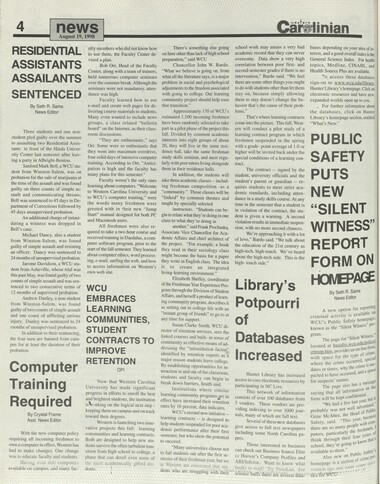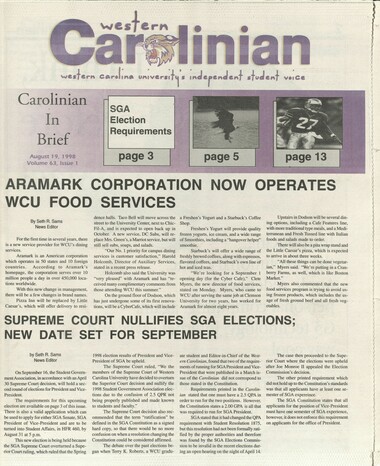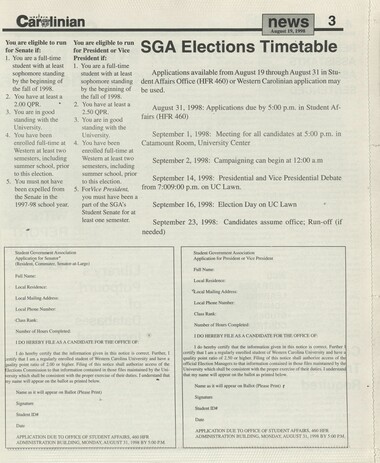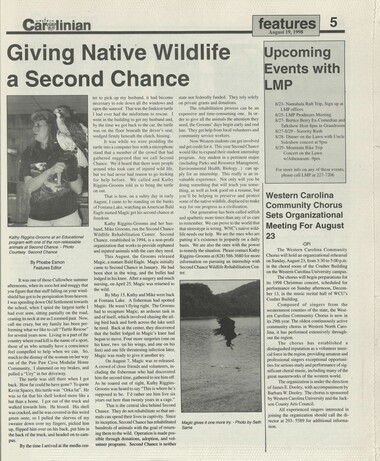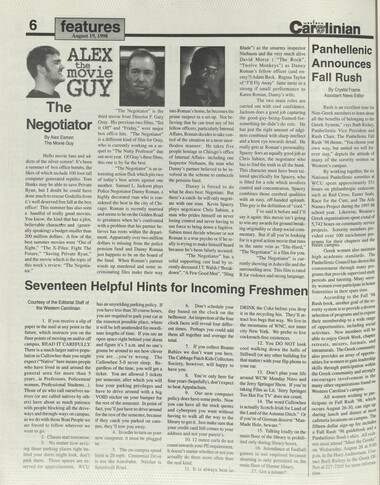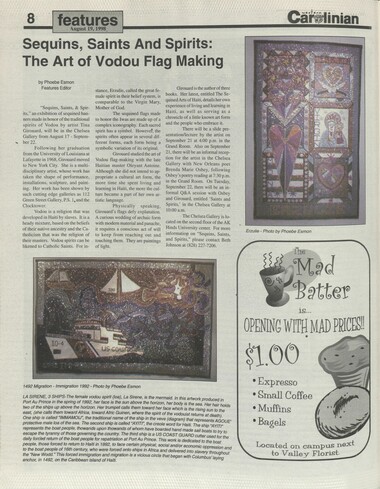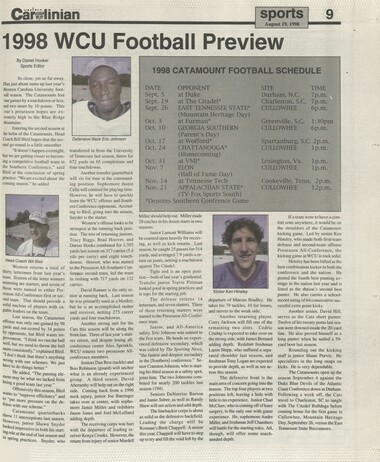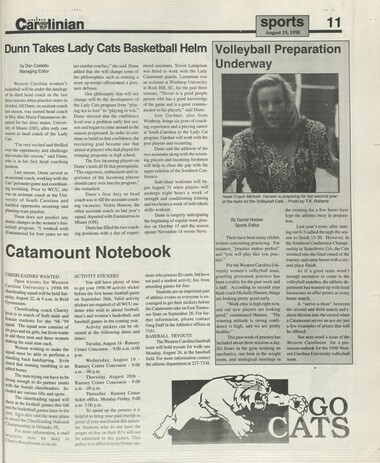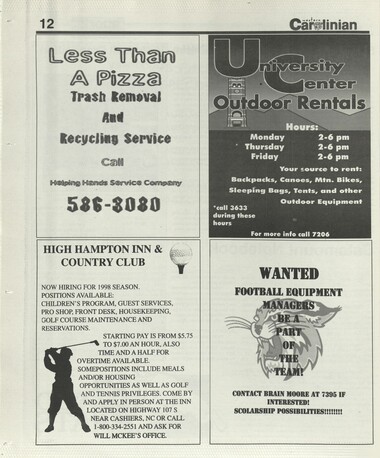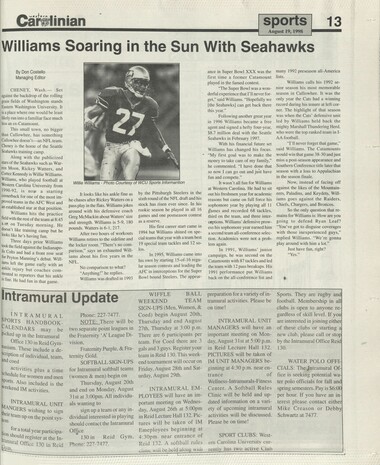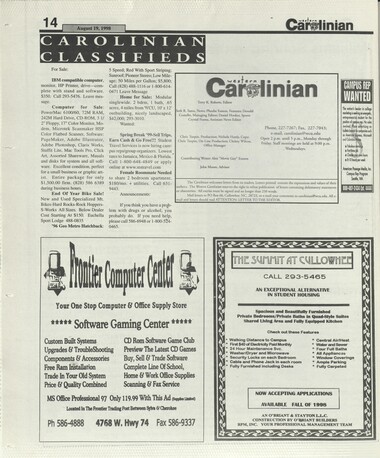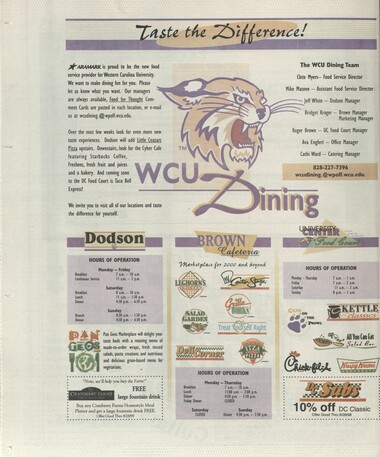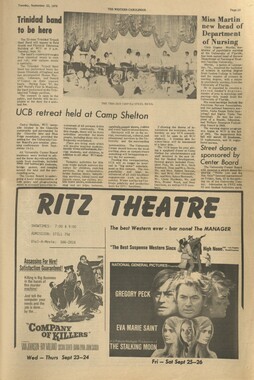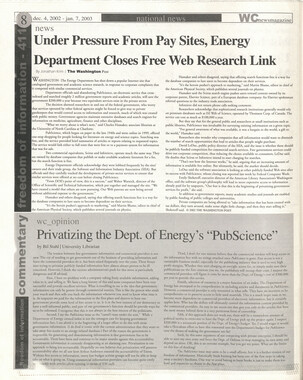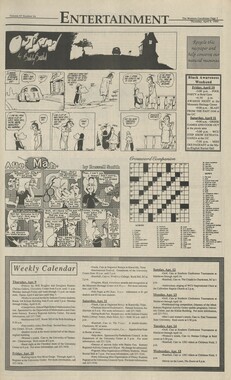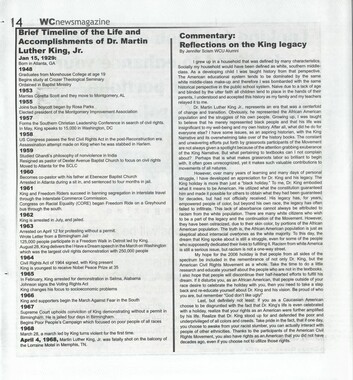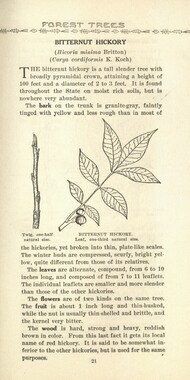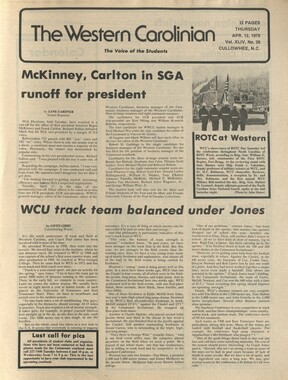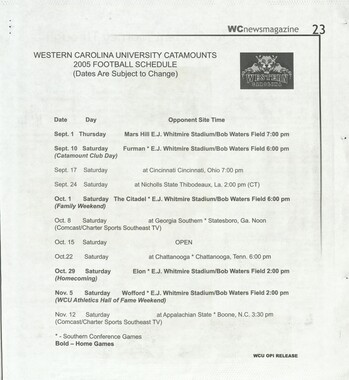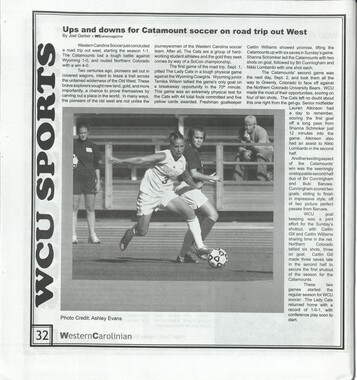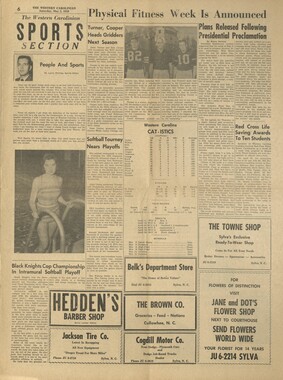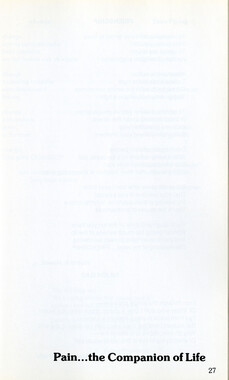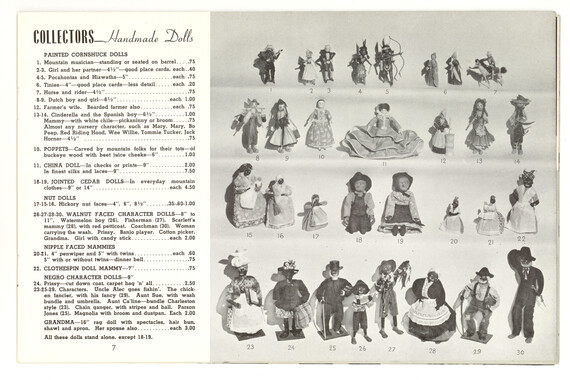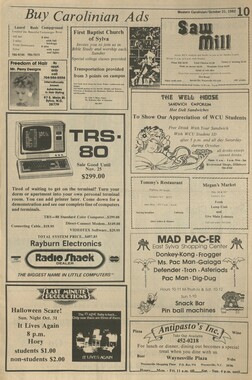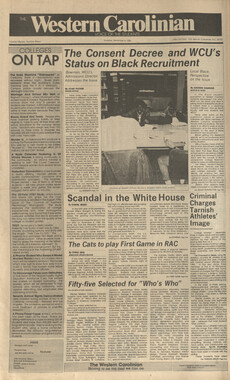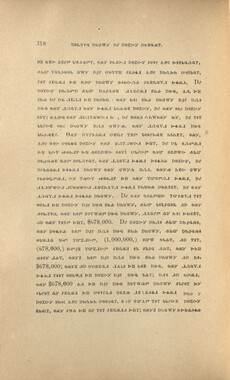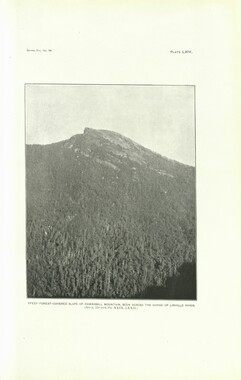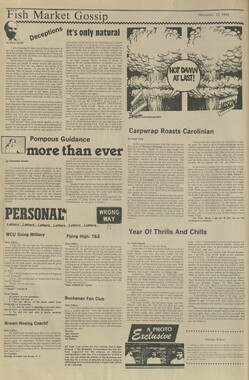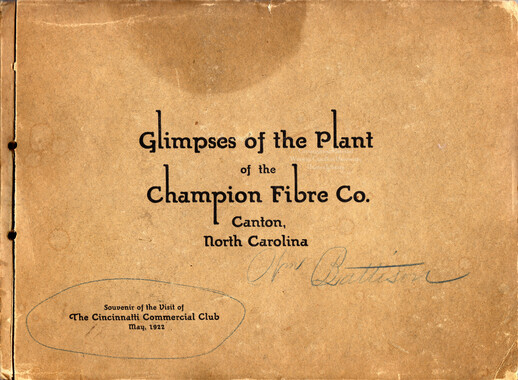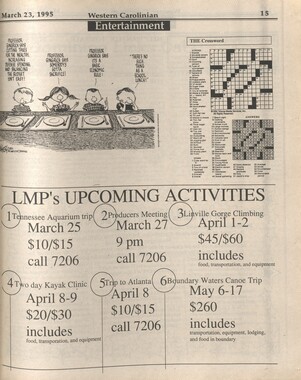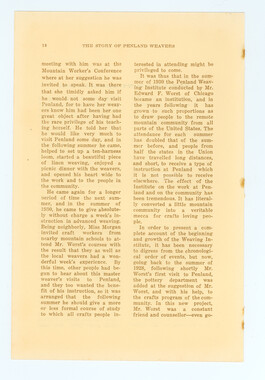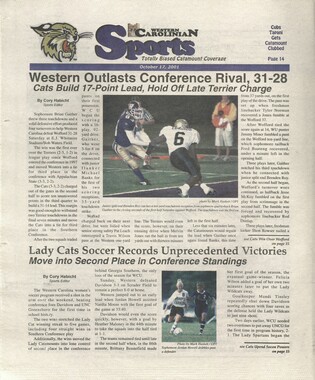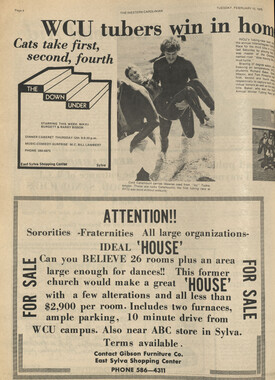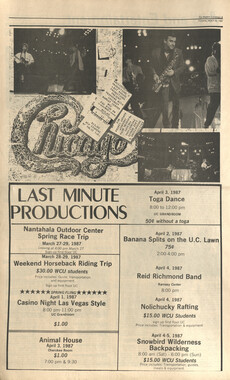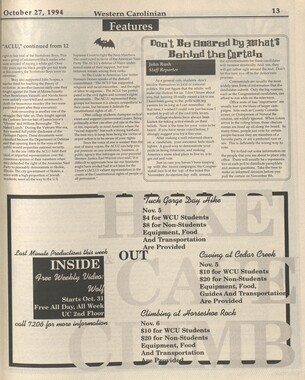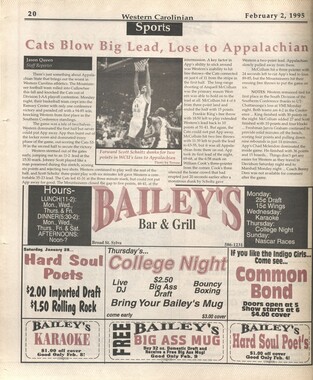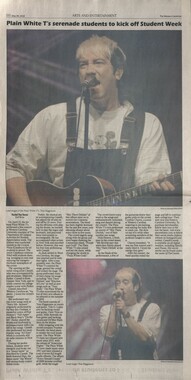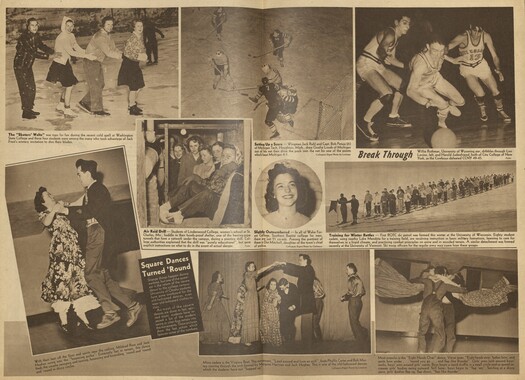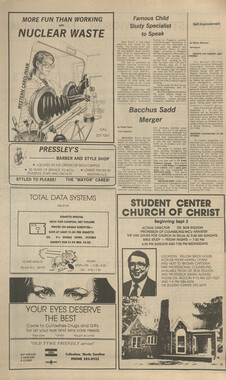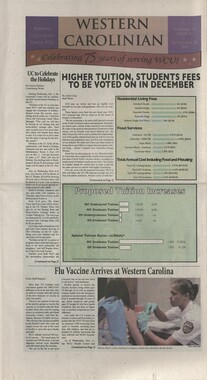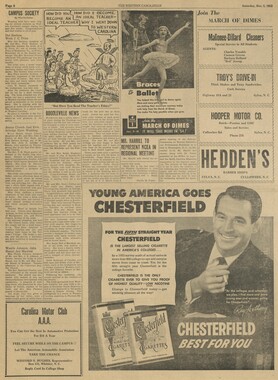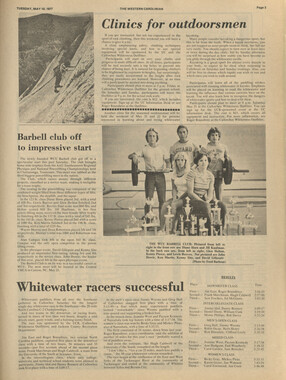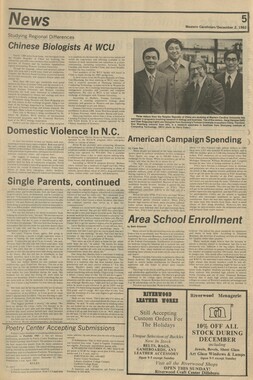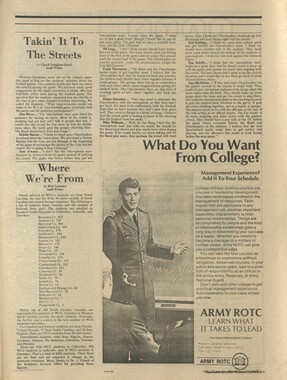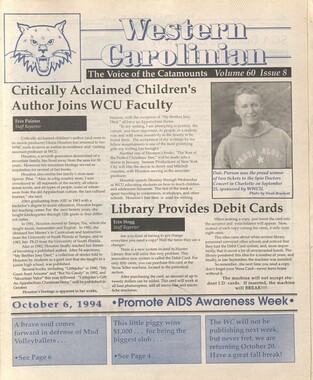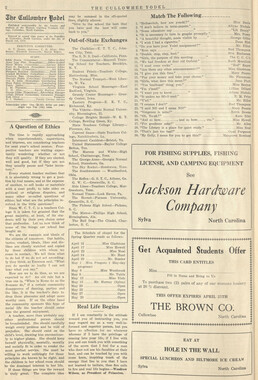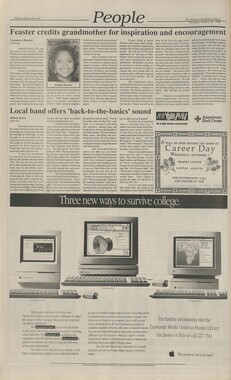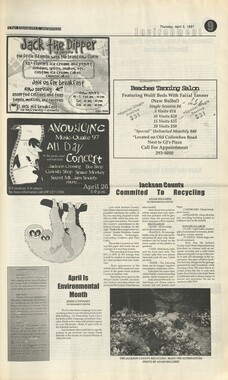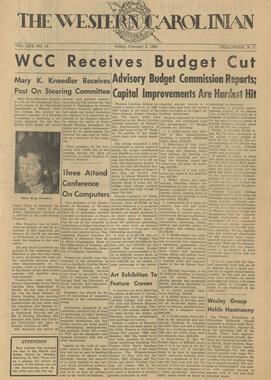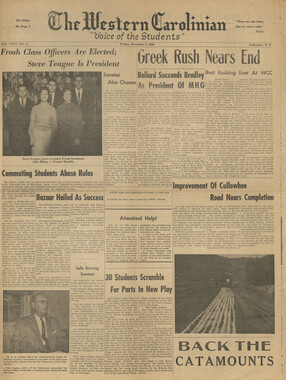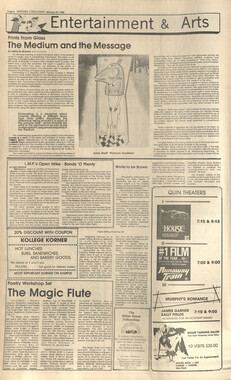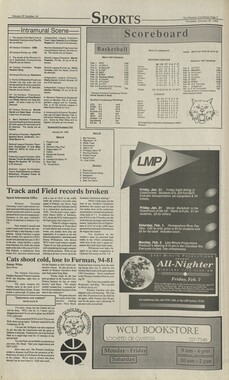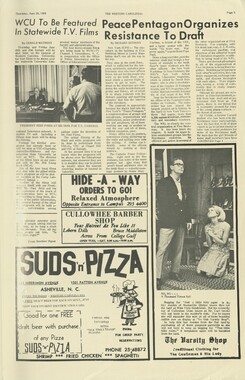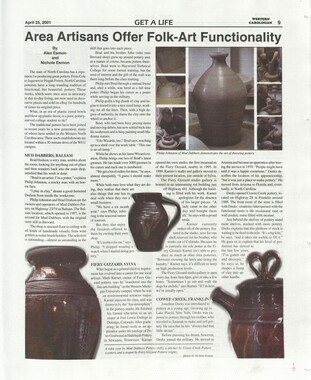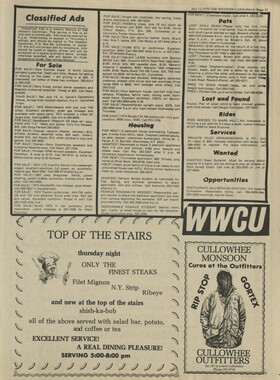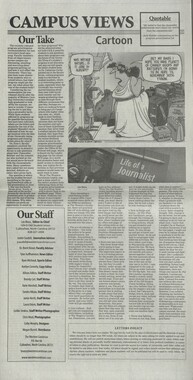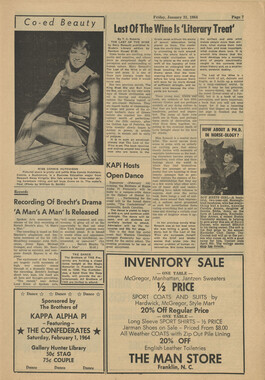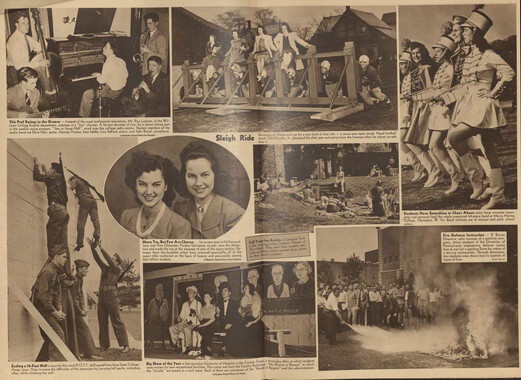Western Carolina University (21)
View all
- Canton Champion Fibre Company (2308)
- Cherokee Traditions (291)
- Civil War in Southern Appalachia (165)
- Craft Revival (1942)
- George Masa Collection (137)
- Great Smoky Mountains - A Park for America (3080)
- Highlights from Western Carolina University (422)
- Horace Kephart (973)
- Journeys Through Jackson (159)
- LGBTQIA+ Archive of Jackson County (89)
- Oral Histories of Western North Carolina (318)
- Picturing Appalachia (6617)
- Stories of Mountain Folk (413)
- Travel Western North Carolina (153)
- Western Carolina University Fine Art Museum Vitreograph Collection (129)
- Western Carolina University Herbarium (92)
- Western Carolina University: Making Memories (738)
- Western Carolina University Publications (2491)
- Western Carolina University Restricted Electronic Theses and Dissertations (146)
- Western North Carolina Regional Maps (71)
- World War II in Southern Appalachia (131)
University of North Carolina Asheville (6)
View all
- Allanstand Cottage Industries (62)
- Appalachian National Park Association (53)
- Bennett, Kelly, 1890-1974 (1463)
- Berry, Walter (76)
- Brasstown Carvers (40)
- Carver, George Washington, 1864?-1943 (26)
- Cathey, Joseph, 1803-1874 (1)
- Champion Fibre Company (233)
- Champion Paper and Fibre Company (297)
- Cherokee Indian Fair Association (16)
- Cherokee Language Program (22)
- Crowe, Amanda (40)
- Edmonston, Thomas Benton, 1842-1907 (7)
- Ensley, A. L. (Abraham Lincoln), 1865-1948 (275)
- Fromer, Irving Rhodes, 1913-1994 (70)
- George Butz (BFS 1907) (46)
- Goodrich, Frances Louisa (120)
- Grant, George Alexander, 1891-1964 (96)
- Heard, Marian Gladys (60)
- Kephart, Calvin, 1883-1969 (15)
- Kephart, Horace, 1862-1931 (313)
- Kephart, Laura, 1862-1954 (67)
- Laney, Gideon Thomas, 1889-1976 (439)
- Masa, George, 1881-1933 (61)
- McElhinney, William Julian, 1896-1953 (44)
- Niggli, Josephina, 1910-1983 (10)
- North Carolina Park Commission (105)
- Osborne, Kezia Stradley (9)
- Owens, Samuel Robert, 1918-1995 (11)
- Penland Weavers and Potters (36)
- Roberts, Vivienne (15)
- Roth, Albert, 1890-1974 (142)
- Schenck, Carl Alwin, 1868-1955 (1)
- Sherrill's Photography Studio (2565)
- Southern Highland Handicraft Guild (127)
- Southern Highlanders, Inc. (71)
- Stalcup, Jesse Bryson (46)
- Stearns, I. K. (213)
- Thompson, James Edward, 1880-1976 (226)
- United States. Indian Arts and Crafts Board (130)
- USFS (683)
- Vance, Zebulon Baird, 1830-1894 (1)
- Weaver, Zebulon, 1872-1948 (58)
- Western Carolina College (230)
- Western Carolina Teachers College (282)
- Western Carolina University (2008)
- Western Carolina University. Mountain Heritage Center (18)
- Whitman, Walt, 1819-1892 (10)
- Wilburn, Hiram Coleman, 1880-1967 (73)
- Williams, Isadora (3)
- Cain, Doreyl Ammons (0)
- Crittenden, Lorraine (0)
- Rhodes, Judy (0)
- Smith, Edward Clark (0)
- Appalachian Region, Southern (3032)
- Asheville (N.C.) (1945)
- Avery County (N.C.) (26)
- Blount County (Tenn.) (195)
- Buncombe County (N.C.) (1680)
- Cherokee County (N.C.) (283)
- Clay County (N.C.) (556)
- Graham County (N.C.) (238)
- Great Smoky Mountains National Park (N.C. and Tenn.) (525)
- Haywood County (N.C.) (3573)
- Henderson County (N.C.) (70)
- Jackson County (N.C.) (4925)
- Knox County (Tenn.) (35)
- Knoxville (Tenn.) (13)
- Lake Santeetlah (N.C.) (10)
- Macon County (N.C.) (421)
- Madison County (N.C.) (216)
- McDowell County (N.C.) (39)
- Mitchell County (N.C.) (135)
- Polk County (N.C.) (35)
- Qualla Boundary (982)
- Rutherford County (N.C.) (78)
- Swain County (N.C.) (2185)
- Transylvania County (N.C.) (270)
- Watauga County (N.C.) (12)
- Waynesville (N.C.) (86)
- Yancey County (N.C.) (72)
- Aerial Photographs (3)
- Aerial Views (60)
- Albums (books) (4)
- Articles (1)
- Artifacts (object Genre) (228)
- Bibliographies (1)
- Biography (general Genre) (2)
- Cards (information Artifacts) (38)
- Clippings (information Artifacts) (192)
- Copybooks (instructional Materials) (3)
- Crafts (art Genres) (622)
- Depictions (visual Works) (21)
- Design Drawings (1)
- Digital Moving Image Formats (2)
- Drawings (visual Works) (185)
- Envelopes (101)
- Exhibitions (events) (1)
- Facsimiles (reproductions) (1)
- Fiction (general Genre) (4)
- Financial Records (12)
- Fliers (printed Matter) (67)
- Glass Plate Negatives (381)
- Guidebooks (2)
- Internegatives (10)
- Interviews (823)
- Land Surveys (102)
- Letters (correspondence) (1045)
- Manuscripts (documents) (618)
- Maps (documents) (177)
- Memorandums (25)
- Minutes (administrative Records) (59)
- Negatives (photographs) (6090)
- Newsletters (1290)
- Newspapers (2)
- Notebooks (8)
- Occupation Currency (1)
- Paintings (visual Works) (1)
- Pen And Ink Drawings (1)
- Periodicals (194)
- Personal Narratives (10)
- Photographs (12977)
- Plans (maps) (1)
- Poetry (6)
- Portraits (4568)
- Postcards (329)
- Programs (documents) (181)
- Publications (documents) (2444)
- Questionnaires (65)
- Relief Prints (26)
- Sayings (literary Genre) (1)
- Scrapbooks (282)
- Sheet Music (2)
- Slides (photographs) (402)
- Songs (musical Compositions) (2)
- Sound Recordings (802)
- Specimens (92)
- Speeches (documents) (18)
- Tintypes (photographs) (8)
- Transcripts (329)
- Text Messages (0)
- A.L. Ensley Collection (275)
- Appalachian Industrial School Records (7)
- Appalachian National Park Association Records (336)
- Axley-Meroney Collection (2)
- Bayard Wootten Photograph Collection (20)
- Bethel Rural Community Organization Collection (7)
- Blumer Collection (5)
- C.W. Slagle Collection (20)
- Canton Area Historical Museum (2110)
- Carlos C. Campbell Collection (462)
- Cataloochee History Project (64)
- Cherokee Studies Collection (4)
- Daisy Dame Photograph Album (5)
- Daniel Boone VI Collection (1)
- Doris Ulmann Photograph Collection (112)
- Elizabeth H. Lasley Collection (1)
- Elizabeth Woolworth Szold Fleharty Collection (4)
- Frank Fry Collection (95)
- George Masa Collection (173)
- Gideon Laney Collection (452)
- Hazel Scarborough Collection (2)
- Hiram C. Wilburn Papers (28)
- Historic Photographs Collection (236)
- Horace Kephart Collection (861)
- Humbard Collection (33)
- Hunter and Weaver Families Collection (1)
- I. D. Blumenthal Collection (4)
- Isadora Williams Collection (4)
- Jesse Bryson Stalcup Collection (47)
- Jim Thompson Collection (224)
- John B. Battle Collection (7)
- John C. Campbell Folk School Records (80)
- John Parris Collection (6)
- Judaculla Rock project (2)
- Kelly Bennett Collection (1482)
- Love Family Papers (11)
- Major Wiley Parris Civil War Letters (3)
- Map Collection (12)
- McFee-Misemer Civil War Letters (34)
- Mountain Heritage Center Collection (4)
- Norburn - Robertson - Thomson Families Collection (44)
- Pauline Hood Collection (7)
- Pre-Guild Collection (2)
- Qualla Arts and Crafts Mutual Collection (12)
- R.A. Romanes Collection (681)
- Rosser H. Taylor Collection (1)
- Samuel Robert Owens Collection (94)
- Sara Madison Collection (144)
- Sherrill Studio Photo Collection (2558)
- Smoky Mountains Hiking Club Collection (616)
- Stories of Mountain Folk - Radio Programs (374)
- The Reporter, Western Carolina University (510)
- Venoy and Elizabeth Reed Collection (16)
- WCU Gender and Sexuality Oral History Project (36)
- WCU Mountain Heritage Center Oral Histories (25)
- WCU Oral History Collection - Mountain People, Mountain Lives (71)
- WCU Students Newspapers Collection (1923)
- Western North Carolina Tomorrow Black Oral History Project (69)
- William Williams Stringfield Collection (2)
- Zebulon Weaver Collection (109)
- African Americans (390)
- Appalachian Trail (35)
- Artisans (521)
- Cherokee art (84)
- Cherokee artists -- North Carolina (10)
- Cherokee language (21)
- Cherokee pottery (101)
- Cherokee women (208)
- Church buildings (190)
- Civilian Conservation Corps (U.S.) (111)
- College student newspapers and periodicals (2012)
- Dams (108)
- Dance (1023)
- Education (222)
- Floods (63)
- Folk music (1015)
- Forced removal, 1813-1903 (2)
- Forest conservation (220)
- Forests and forestry (1198)
- Gender nonconformity (4)
- Great Smoky Mountains National Park (N.C. and Tenn.) (181)
- Hunting (47)
- Landscape photography (25)
- Logging (122)
- Maps (83)
- Mines and mineral resources (9)
- North Carolina -- Maps (18)
- Paper industry (38)
- Postcards (255)
- Pottery (135)
- Railroad trains (72)
- Rural electrification -- North Carolina, Western (3)
- School integration -- Southern States (2)
- Segregation -- North Carolina, Western (5)
- Slavery (5)
- Sports (452)
- Storytelling (243)
- Waterfalls -- Great Smoky Mountains (N.C. and Tenn.) (66)
- Weaving -- Appalachian Region, Southern (280)
- Wood-carving -- Appalachian Region, Southern (328)
- World War, 1939-1945 (173)
Western Carolinian Volume 63 (64) Number 01
Item
Item’s are ‘child’ level descriptions to ‘parent’ objects, (e.g. one page of a whole book).
-
-
news August 19,1998 inian RESIDENTIAL ASSISTANTS ASSAILANTS SENTENCED By Seth R. Sams News Editor Three students and one non- student pled guilty over the summer to assaulting two Residential Assistants in front of the Hinds University Center last semester after leaving a party in Albright-Benton. Sanford Mark Bell, a WCU student from Winston-Salem, was on probation for the sale of marijuana at the time of the assault and was found guilty on three counts of simple assault and communicating threats; Bell was sentenced to 45 days in Department of Corrections followed by 45 days unsupervised probation. An additional charge of intimidating a witness was dropped in Bell's case. Michael Dancy, also a student from Winston-Salem, was found guilty of simple assault and resisting an officer; Dancy was sentenced to 24 months of unsupervised probation. Jarome Davidson, a WCU student from Asheville, whose trial was this past May, was found guilty of two counts of simple assault and was sentenced to two consecutive terms of 12 months of supervised probation. Andrew Danley, a non-Student from Winston-Salem, was found guilty of two counts of simple assault and one count of afflicting serious injury. Danley was sentenced to 24 months of unsupervised probation. In addition to their sentencing, the four men are banned from campus for at least the duration of their probation. Computer Training Required By Crystal Frame Asst. News Editor With the new computer policy requiring all incoming freshmen to own a computer in effect, Western has had to make changes. One change was to educate faculty and students. Having over oOu compui available on campus, and many fac ulty members who did not know how to use them, the Faculty Center devised a plan. Bob Orr, Head of the Faculty Center, along with a team of trainers, held numerous computer seminars over the summer break. Although the seminars were not mandatory, attendance was high. Faculty learned how to use e-mail and create web pages for delivering course materials to students. Many even wanted to include news groups, a class related "bulletin board" on the Internet, as their classroom discussions. "They are enthusiastic," says Orr. Some were so enthusiastic that they went into maximum overdrive, four solid days of intensive computer training. According to Orr, "Anticipation is high and the faculty has many plans for this semester." Faculty weren't the only ones learning about computers. "Welcome to Western Carolina University and to WCU's computer training," were the words many freshmen were greeted with in their new "Jump Start" manual designed for both PC and Macintosh users. All freshmen were also required to take a two hour course and received training in Daedalus, a computer software program, prior to the start of the fall semester. They learned about computer ethics, word processing, e-mail, surfing the web, and how to access information on Western's own web site. WCU EMBRACES LEARNING COMMUNITIES, STUDENT CONTRACTS TO IMPROVE RETENTION OPI Now that Western Carolina University has made significant progress in efforts to enroll the best and brightest students, the institution isVorking on the logical next step - keeping them on campus and on track toward their degrees. Western is launching two innovative projects this fall: learning communities and learning contracts. Both are designed to help new students survive the often turbulent transition from high school to college, a phase that can derail even some of the nlost academically gifted students. There's something else going on here other than lack of high school preparation," said WCU Chancellor John W. Bardo. "What we believe is going on, from what all the literature says, is a major problem in social and psychological adjustments to the freedom associated with going to college. Our learning community project should help ease that transition." Approximately 170 of WCU's estimated 1,100 incoming freshmen have been randomly selected to take part in a pilot phase of the project this fall. Divided by common academic interests into eight groups of about 20, they will live in the same residence hall, take the same freshman study skills seminar, and meet regularly with peer tutors living alongside them in their residence halls. In addition, the students will take three academic classes - including freshman composition -as a "community." Those classes will be "linked" by common themes and taught by specially selected instructors. "Students can begin to relate what they're doing in one class to what they're doing in another," said Frank Prochaska, Associate Vice Chancellor for Academic Affairs and chief architect of the project. "For example, a book they read in their sociology class might become the basis for a paper they write in English class. The idea rs to create an integrated living-learning environment." Elizabeth Shelley, coordinator of the Freshman Year Experience Program through the Division of Student Affairs, and herself a product of learning community program, describes it as setting out in college life with an "instant group of friends" to go to at any time for support. Susan Clarke Smith, WCU director of retention services, sees the linked courses and built- in sense of community as effective means of addressing the "intimidation factor" identified by retention experts as a major reason students leave college. By establishing opportunities for interaction in and out of the classroom, students and faculty can begin to break down barriers, Smith said. Institutions where similar learning community programs are in effect have increased their retention rates by 16 percent, data indicates. WCU's second new initiative - learning contracts - is designed to help students suspended for poor academic performance after their first semester, but who show the potential to succeed. "Many universities choose not to fail students out after the first semester of their freshman year, but we at Western are concerned that students who are struggling'with their school work may amass a very bad academic record that they can never overcome. Data show a very high correlation between poor first- and second-semester grades if there is no intervention," Bardo said. "We feel there are some other things you ought to do with students other than let them stay on, because simply allowing them to stay doesn't change the behavior that's the cause of their problems." That's where learning contracts come into the picture. This fall, Western will conduct a pilot study of a learning contract program in which freshmen suspended in the spring with a grade- point average of 1.0 or higher will be invited back under the special conditions of a learning contract. The contract — signed by the student, university officials and the student's parent or guardian — requires students to meet strict academic standards, including attendance in a study skills course. At any time in the semester that a student is in violation of the contract, the student is given a warning. A second violation results in immediate suspension, with no more second chances. We're approaching it with a lot of love," Bardo said. "We talk about the education of the 21st century as high-tech, high-touch. We've heard about the high-tech side. This is the high- touch side." Library's Potpourri of Databases Increased Hunter Library has increased access to core electronic resources by participating in NC Live. This network of information consists of over 100 databases from 5 vendors. These vendors are providing indexing to over 3000 journals, many of which are full text. Several of these new databases give access to full text newspapers including some North Carolina papers. Those interested in business can check out Business Source Elite or Hoover's Company Profiles and ABI/Inform. Want to know what , i?°tokl --List. For science Tiuffs-thcre arc several data bases depending on your area of interest, and a good overall index is the General Science Index. For health topics, Medline, CINAHL, and Health Source Plus are available. To access these databases sign-on to www.wcu.edu/lihrary. Hunter Library's homepage. Click on electronic resources and have new, expanded worlds open up to you. For further information about the databases, click on Hunter Library's homepage section, entitled "What's New." PUBLIC SAFETY PUTS NEW "SILENT WITNESS" REPORT FORM ON HOMEPAGE By Seth R. Sams News Editor A new option for reporting criminal activity is available on WCU's Public Safety homepage- known as the "Silent Witness pro gram- f Silent Witness," The page for Silent wi located at busafe.w^ec]^ crmstpjitm, Prides an on-hnet with space for the type of cr where the crime occurred sp dates or times, why the enme • pected to have occurred, and asp for suspects'names. sage The page also has a saying that all infon;auo^ form will be kept confide""*' it •Wehadafewlasye^.: probably was not well a ^ Gene McAbee, the HeiW ^^ Safety, said. "Th's y?,a with com- therearesomanypeopl , puters, particularly the of think through their four >that.s school, they're going to available to them." „ fety's homepage is a section o ncsfoi'WCUr"
Object
Object’s are ‘parent’ level descriptions to ‘children’ items, (e.g. a book with pages).
-
The Western Carolinian is Western Carolina University's student-run newspaper. The paper was published as the Cullowhee Yodel from 1924 to 1931 before changing its name to The Western Carolinian in 1933.
-
